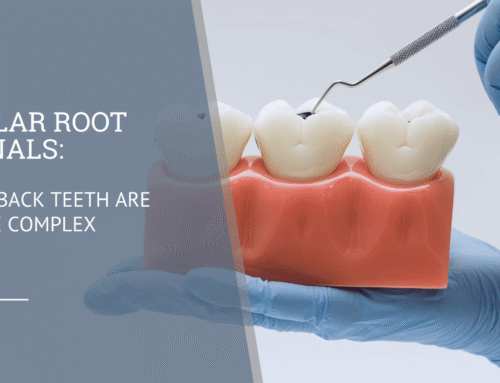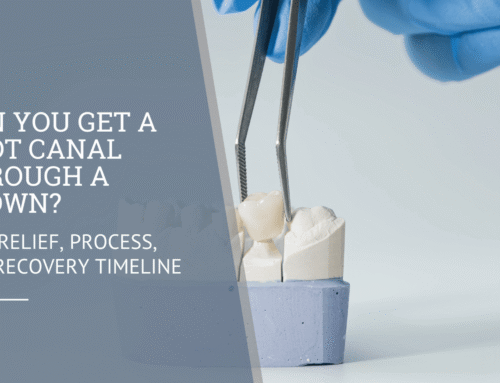If your dentist tells you that you need a root canal, you might wonder: should you go back to your general dentist, or see a root canal specialist?
It’s a great question — and one more patients are asking than ever before. While both can perform root canals, an endodontist (root canal specialist) offers advanced training, specialized tools, and higher precision for complex or infected teeth.
At Eastern Idaho Endodontics, this is what we do every day — and it makes all the difference.
What Is a Root Canal Specialist?
A root canal specialist, known as an endodontist, is a dentist who has completed two to three additional years of advanced training focused solely on diagnosing and treating problems inside the tooth — the pulp and root canals.
That training includes expertise in pain management, microscopic precision, and advanced infection control techniques to help patients save their natural teeth comfortably and efficiently.
How an Endodontist Differs from a General Dentist
While both professionals care for your oral health, they focus on different areas:
| Focus Area | General Dentist | Root Canal Specialist (Endodontist) |
|---|---|---|
| Scope of Care | Cleanings, fillings, crowns, and preventive care | Root canals, retreatments, apicoectomies, and trauma repair |
| Training | 4 years of dental school | 4 years dental + 2–3 years specialty training |
| Experience | Performs a few root canals per month | Performs hundreds per year |
| Technology | Standard dental tools | Advanced microscopes, 3D imaging, and EdgePro laser systems |
| Complex Cases | May refer to a specialist | Treats complex or previously failed root canals |
Training and Expertise Comparison
An endodontist’s entire practice revolves around saving teeth through root canal therapy and related procedures.
Their advanced education includes in-depth anatomy training, pain control, and the use of specialized technologies that help navigate complex canal systems — skills that go beyond what’s taught in dental school.
Equipment and Technology Used
At Eastern Idaho Endodontics, we use advanced tools that most general practices don’t have, including:
-
3D cone-beam imaging (CBCT) for detailed internal scans
-
Operating microscopes for precise visualization of canal structures
-
EdgePro laser systems for gentle, thorough sterilization in non-curved root canals
These technologies improve accuracy, reduce discomfort, and help prevent future complications.
When to See a Root Canal Specialist
You should consider seeing an endodontist if:
-
Your tooth has severe pain or swelling
-
You’ve had a previous root canal that failed
-
The tooth has a complex or curved root structure
-
You’ve experienced dental trauma or cracked a tooth
-
You want the most precise, comfortable outcome possible
Benefits of Seeing an Endodontist
-
Higher success rates with fewer complications
-
Faster recovery thanks to laser-assisted precision
-
Specialized pain management for even the most anxious patients
-
Focused expertise — this is their everyday specialty
-
Advanced equipment that identifies hidden canals missed elsewhere
Can General Dentists Perform Root Canals?
Yes — general dentists are trained to perform basic root canal treatments. However, they often refer more complex or retreatment cases to a root canal specialist to ensure the best results.
Just like you’d see a cardiologist for a heart issue, an endodontist is your specialist for root canal care.
How to Know If You Need a Specialist
If you’re experiencing persistent pain, a failed root canal, or your dentist has mentioned complications such as curved canals, it’s wise to see a specialist first.
Endodontists have the tools, experience, and precision to diagnose and treat issues that general dentistry might overlook.
What to Expect at Eastern Idaho Endodontics
Our process is designed for comfort and clarity from start to finish:
-
Comprehensive consultation with 3D imaging
-
Personalized treatment plan based on your tooth anatomy
-
Gentle laser-assisted care using the EdgePro system for precision
-
Follow-up guidance to ensure smooth, pain-free recovery
Every visit focuses on saving your tooth and protecting your long-term oral health.
Cost Differences Between Specialists and General Dentists
Because endodontists use advanced tools and techniques, the cost may be slightly higher.
However, specialist treatment often prevents the need for future retreatments, saving you money — and discomfort — in the long run.
How Advanced Technology Improves Results
Modern tools like EdgePro lasers, microscopes, and CBCT scans allow us to locate hidden canals, remove bacteria more effectively, and minimize post-treatment sensitivity.
This precision significantly increases the success rate of every root canal we perform.
Final Thoughts
When it comes to saving your natural tooth, experience matters.
A root canal specialist offers the skill, technology, and focus needed for the best long-term results — especially for challenging or previously treated teeth.
At Eastern Idaho Endodontics, we’re here to make that process as comfortable, precise, and effective as possible.
FAQs
1. Do I need a referral to see an endodontist?
Not always — you can call our office directly for a consultation.
2. Are root canals more expensive with a specialist?
They may cost slightly more upfront, but offer better outcomes and lower retreatment rates.
3. Do endodontists only perform root canals?
Mostly, yes — they also handle retreatments, trauma care, and apicoectomies.
4. How long does a root canal with a specialist take?
Typically about an hour, depending on complexity.
5. Can a specialist fix a failed root canal?
Yes — retreatment and laser sterilization can often fully restore the tooth.




